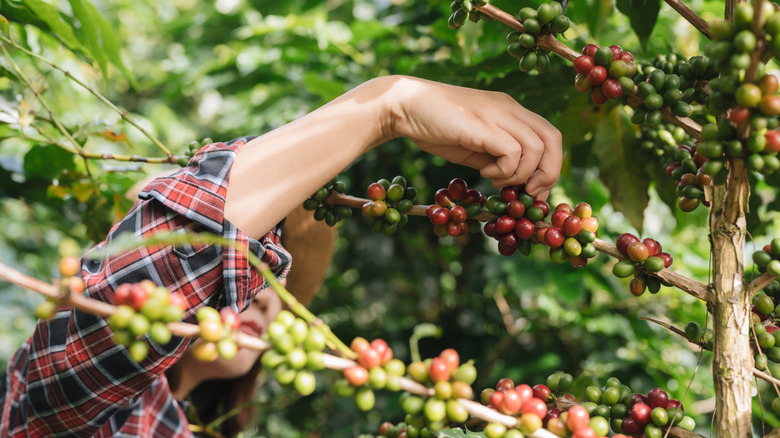Your Coffee Might Get Even More Expensive In 2025
People commonly think that coffee is too expensive, but unfortunately, it's likely to get even pricier in the near future, and the culprit is climate change. NBC News reported that the price of arabica beans recently spiked to $3.50 a pound — a 70% increase from last year, and the biggest price hike since a massive frost in 1977 killed over a billion coffee trees.
David Ortega, a professor of food economics and policy at Michigan State University, told NBC News that climate change has contributed to "significant drought in some of the key coffee-growing areas of the world, places like Brazil," which recently suffered a catastrophic two-year drought, its worst in at least 70 years. As the world's largest coffee exporter, the Brazilian drought carries a disproportionate impact, one expected to directly hit consumers.
Arabica beans worldwide account for approximately 60% of coffee production, so this rise in prices is anticipated to have a noticeable effect on the global coffee market. And it's not just arabica beans: Other coffee varieties are grown in similar climates, such as robusta beans in Vietnam, a country that has also struggled with historic droughts.
Coffee's climate change problems reflect wider issues
Consumers are already suffering from years of generally high grocery prices, and despite some predictions that the price of coffee would plateau soon, climate change and bean markets suggest the opposite.
Coffee is far from the only food crop to be negatively affected by climate change. Brewers predict that hops will become more bitter and difficult to grow, altering flavor profiles of beer and raising production costs. The wine industry faces similar climate-related issues, with hotter temperatures and drier seasons changing sensitive wine grapes, or for some varieties, exterminating them entirely.
As with hops and grapes, the ongoing difficulty of growing enough coffee plants to keep up with incredible global demand is at the root of price increases. In Brazil, where an area roughly half the size of the United States is under water stress, coffee growers saw a shortfall of millions of bags in 2024 — and millions more are predicted for 2025/26, which will be the fifth consecutive year of production deficits.

